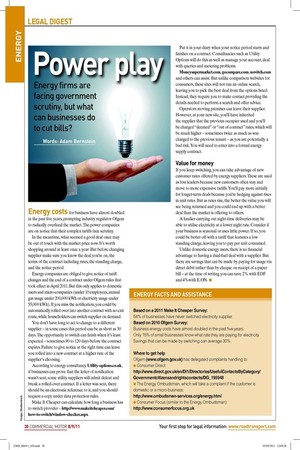Power play
Page 24

If you've noticed an error in this article please click here to report it so we can fix it.
Energy firms are facing government scrutiny, but what can businesses do to cut bills?
Words: Adam Bernstein Energy costs for business have almost doubled in the past ive years, prompting industry regulator Ofgem to radically overhaul the market. The power companies are on notice that their complex tariffs face scrutiny.
In the meantime, what seemed a good deal once may be out of touch with the market price now. It’s worth shopping around at least once a year. But before changing supplier make sure you know the deal you’re on, the terms of the contract including rates, the standing charge, and the notice period.
Energy companies are obliged to give notice of tariff changes and the end of a contract under Ofgem rules that took effect in April 2011. But this only applies to domestic users and micro-companies (under 10 employees, annual gas usage under 200,000 kWh or electricity usage under 55,000 kWh). If you miss the notiication, you could be automatically rolled over into another contract with no exit route, while householders can switch supplier on demand.
You don’t have long to act to change to a different supplier – in some cases this period can be as short as 30 days. The opportunity to switch can inish when it’s least expected – sometimes 90 to 120 days before the contract expires. Failure to give notice at the right time can leave you rolled into a new contract at a higher rate of the supplier’s choosing.
According to energy consultancy Utility-options.co.uk, if businesses can prove that the letter of notiication wasn’t sent, some utility suppliers will admit defeat and break a rolled-over contract. If a letter was sent, there should be an electronic reference to it, and you should request a copy under data protection rules.
Make It Cheaper can calculate how long a business has to switch provider – http://www.makeitcheaper.com/ how-to-switch/window-checker.aspx. Put it in your diary when your notice period starts and inishes on a contract. Consultancies such as Utility Options will do this as well as manage your account, deal with queries and metering problems.
Moneysupermarket.com, gocompare.com, uswitch.com and others can assist. But unlike comparison websites for consumers, these sites will not run an online search, leaving you to pick the best deal from the options listed. Instead, they require you to make contact providing the details needed to perform a search and offer advice.
Operators moving premises can leave their supplier. However, at your new site, you’ll have inherited the supplier that the previous occupier used and you’ll be charged “deemed” or “out of contract” rates, which will be much higher – sometimes twice as much as was charged to the previous tenant – as you are potentially a bad risk. You will need to enter into a formal energy supply contract.
Value for money
If you keep switching, you can take advantage of new customer rates offered by energy suppliers. These are used as loss leaders because new customers often stay and move to more expensive tariffs. You’ll pay more initially for longer-term deals because you’re hedging against rises in unit rates. But as rates rise, the better the value you will see being returned and you could end up with a better deal than the market is offering to others.
A haulier carrying out night-time deliveries may be able to utilise electricity at a lower night rate. Consider if your business is seasonal or uses little power. If so, you could be better off with a tariff that features a low standing charge, leaving you to pay per unit consumed.
Unlike domestic energy users, there is no inancial advantage to having a dual-fuel deal with a supplier. But there are savings that can be made by paying for usage via direct debit rather than by cheque on receipt of a paper bill – at the time of writing you can save 2% with EDF and 4%with E.ON. ■












































